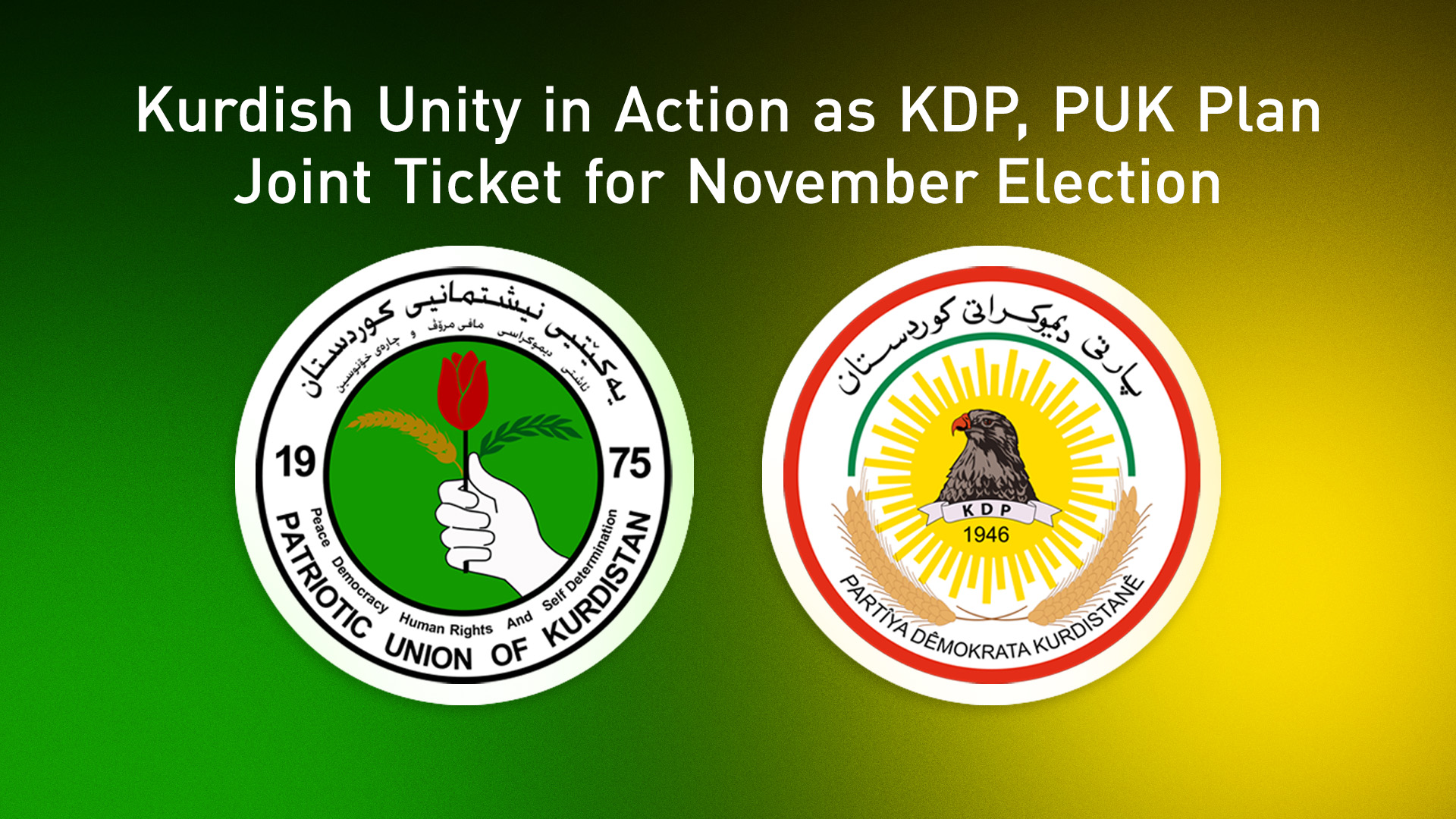Kurdish Unity in Action as KDP, PUK Plan Joint Ticket for November Election
Kurdistan24 reporter Nawres Abdullah, who first broke the story, said the talks focused on forming a joint electoral list for the upcoming Iraqi elections, particularly in Kurdish-majority areas outside the Kurdistan Region’s formal administrative boundaries.

By Kamaran Aziz
ERBIL (Kurdistan24) – In a strategic move aimed at maximizing Kurdish representation in Kurdistani Territories Outside KRG Control, a delegation from the election committee of the Kurdistan Democratic Party (KDP), led by Jaafar Eminki, Head of the Election office of the Kurdistan Democratic Party (KDP), visited the Patriotic Union of Kurdistan (PUK) politburo on Sunday. The delegation was formally received by Rizgar Haji Hama, head of the PUK's election committee, marking the first in-depth technical meeting between the two sides.
Kurdistan24 reporter Nawres Abdullah, who broke the news, reported that the discussions were centered around the possibility of running a joint electoral list for the upcoming Iraqi parliamentary elections, with a particular focus on Kurdish-majority areas located outside the Kurdistan Region’s formal administrative boundaries.
The timing and substance of the meeting reflect mounting concerns among Kurdish political actors that internal fragmentation could again cost them critical seats in key areas such as Kirkuk. Under the current electoral law, parliamentary seats are awarded based on individual candidate vote share, not aggregated party votes. As a result, running too many Kurdish candidates in a single constituency can lead to vote dilution, thereby increasing the chances of rival candidates from other ethnic or sectarian groups clinching victory.
“Today’s meeting marks the first technical dialogue between KDP and PUK on this crucial matter,” Abdullah reported. “The primary objective is to forge a tactical understanding that ensures no Kurdish seat is lost due to scattered voting patterns, especially in disputed zones like Kirkuk.”
This renewed push for coordination comes amid broader discussions within Kurdish political circles about the need to close ranks ahead of critical national elections. Although previous unity initiatives have faced challenges, shifting electoral dynamics and increasing demographic pressures in multiethnic regions now present compelling opportunities for cooperation.
Although no final agreement has yet been reached, both sides are reportedly committed to further rounds of technical talks. The stakes are high: Kurdish political representation in Kurdistani areas remains a litmus test for the broader project of Kurdish political agency within Iraq’s federal framework.
The prospect of a united front between the KDP and PUK signals the potential for a more cohesive cabinet within the Kurdistan Region, while also paving the way for a stronger, unified position in negotiations with Baghdad. Such alignment could enhance Kurdish leverage on issues of national significance and elevate Kurdish representation in both national and regional political arenas.
This is not the first instance of a political alliance between the Kurdistan Region’s leading parties. In 2005, following the fall of Saddam Hussein’s regime, the Kurdistan Democratic Party (KDP), the Patriotic Union of Kurdistan (PUK), and other Kurdistani political groups joined forces to contest Iraq’s first post-Ba’athist parliamentary elections under the banner of the Democratic Patriotic Alliance of Kurdistan (DPAK), also known as the Kurdistan Alliance (KA). The coalition achieved a sweeping victory in the Kurdistan Region, securing 1,570,665 votes—approximately 90% of the total—for the Kurdistan National Assembly. At the federal level, the DPAK garnered nearly 26% of the national vote, translating into 75 out of 275 seats in the Iraqi National Assembly.
This united front continued in the 2010 federal elections under the Kurdistan List, which won 1,681,714 votes—equivalent to 14.37% of the nationwide vote from a total of 10,813,216 ballots cast. The alliance secured 43 seats in the Iraqi Parliament and played a pivotal role in the election of Jalal Talabani as President of Iraq.
As history demonstrates, political unity within the Kurdistan Region has often amplified the effectiveness of the Kurdish cause, both domestically and on the national stage. Renewed discussions around forming a united front could significantly bolster Kurdish representation and provide a stronger, more coherent negotiating position in addressing critical issues between Erbil and Baghdad.
Sunday’s meeting could well be a first step toward a significant shift in Kurdish electoral strategy—one that privileges coordination over competition in the interest of national influence and territorial presence.
